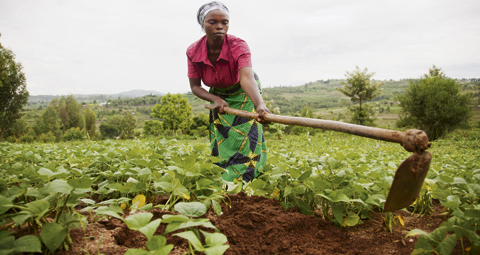BY Ian Dunn | February 13 | ![]() 0 COMMENTS
0 COMMENTS ![]() print
print

Hope grows after a living hell on earth
In the first of a series of special reports throughout Lent, IAN DUNN reports back from Rwanda where he visited a female farming project supported by SCIAF following the genocide in the country 21 years ago. 2015 marks the 50th anniversary of the foundation of The Scottish Catholic International Aid Fund
On the morning of April 15, 1994, more than 5000 men, women and children were crowded into a small Catholic Church in Ntarama, 30km from the Rwandan capital Kigali. That morning several hundred soldiers and local militia arrived at the Church and got to work. They threw grenades through the windows of the Church and gunned down those who tried to escape. Hundreds more were beaten to death. In the small hut brick that served as a Sunday school they took the youngest children, the toddlers, by the feet and one by one smashed their skulls against the wall.
Today, Ntarama Church is a memorial to the victims of the Rwandan Genocide, one of the darkest moments of the 20th century. During those 100 days, the Tutsi—the smaller ethnic group who had been favoured when Rwanda was a colony—were slaughtered in their hundreds of thousands by Hutu militia and soldiers. In that small hut that served as a Sunday school at Ntarama, you can still see that discoloured wall of brick where child after child had their skulls smashed and lost their lives. Small fragments of their brains still cling to the brick.
Twenty-one years ago this Church was hell on earth. Yet today’s Rwanda, with its good roads, its thousand rolling hills covered in crops and its friendly people, seems like a genuinely wonderful place to live.
Rwanda’s people got from that dark place to where they are today because they received the right sort of the help, and they helped themselves.
Horror
Just up the road from Ntarama church, I met Amina Gasengagire.
A plump, middle-aged, self-confident woman, she is a Tutsi and, days after the genocide, began she gave birth to her seventh child. Fearful of the threat from her Hutu neighbours, she and her family fled into the bush.
“Many died, the rest of us lived on berries and insects,” she said. “I thought we would all die.”
Her newborn child did. Miraculously, her other six children survived, and, when the genocide was ended by the advance of Tutsi rebel forces, she and her family where able to return to their home. The cost of the conflict had been great, however, with many friends and family members lost, including her father-in-law.
The great miracle of Rwanda is that, while I was with her, she was visited by her father-in-law’s killer, whom she welcomed into her home.
Jean Baptiste Murangira is 59 and gaunt. He wears a white shirt and a black hat. He and Amina Gasengagire greet each other quite warmly.
He speaks about the genocide.
“We were like animals,” he said. “I cannot explain it.”
He tells of coming across Amina’s father-in-law grieving in the outside his home over the body of his dead wife who had already been killed.
“I hit with a machete and said two people who love each other should die together,” he said. “He was handicapped, he could not get away.”
There are other stories. He talks about being part of a killing squad, leading it, but then becomes vague. After the genocide, he fled to the Congo and later returned to Rwanda where he was arrested and served ten years in jail. At court he confessed to killing two people. Part of the cultural collective reconciliation Rwanda has come to is that if there is a partial confession then further details can remain undisclosed.
“I know I have done evil,” he said. “I believe God will judge me.”
However, Amina has forgiven him.
“I had to overcome my anger to him, who had killed my family,” she said. “I forgave him. The future generations are more important but I still remember what happened.”
Help and healing
Everyone in Rwanda has story like this, of parents and children killed, of murder, of guilt and forgiveness. They don’t talk about Tutsi and Hutu any more, only Rwandans. At times the government pushes this line with a type of almost religious fervour that can be unsettling, but it is hard to see what better outcome there could be.
Rwanda is healing. It has received a huge amount of international aid in the 21 years since the genocide, but much of that has moved on. The best and the smartest help, that is healing the country is still here. And it’s helping Rwandas by empowering those who need it most, its female farmers.
In the town of Nynaza in Southern Rwanda, I met one such group of female farmers. These are the sorts of women who will be helped by the SCIAF 2015 Wee Box appeal, the total of which will be doubled by The UK Government’s Department for International Development (DFID) match scheme this year. The Scottish Catholic International Aid Fund-supported programme that is helping them gave them a small loan as the seed for a self help group. They decide which of their members to loan to, to set up small business and help them farm.
These are strong women, who have suffered and survived by the horrors of genocide, war, HIV and poverty. They have not been defeated.
It has not been easy. Fortuna Mukamasabo is 47 years old and has four children. Six years ago, her husband died.
“I found from a neighbour that he had died of AIDs but had never told me he had it,” she said. “When I went to get tested it was positive for HIV. I went home to bed and stayed there for three weeks. I wanted to die and I was so angry with my dead husband I wanted to dig him up and kill him again. But I thought there was nothing I could do.”
Her older sister came to her and convinced her to carry on for the sake of her children. She got anti-retroviral drugs and became involved with the self-help group.
“I’ve received a number of small loans from the group,” she said. “For seeds and to help me grow other produce. Life is better now than when my husband was alive. I don’t have to worry, we have enough food.”
She also feels far more confident now thanks to the support she has received from the self-help group.
This is a theme other woman repeat: “My mind is clear now, I have the belief I can achieve things.” Isabelle Nyiraninani, 41 tells me. “Before I became involved, I rarely left the house and felt lonely often. Now I have purpose.”
Tensions
Bringing these women together has not only improved their lives and the lives of their families but also helped break down the old ethnic tensions that lay behind the genocide. For all such boundaries were arbitrary, their impact was all too real.
This is shown in the stories of Thamali Cyitegetse and Martha Mungantinka.
Thamali is 39, her father was Tutsi and her mother Hutu, but she is tall and has the finer facial features often associated with Tutsis. Martha, 42, had a Tutsi mother, Hutu father but looks more like a Hutu is expected to look.
For Thamali, the genocide was a time of great fear.
“Because I had a ‘Tutsi face,’ I couldn’t leave the house for fear of being killed,” she said. “Once when I did, a man made me lie on the ground with his machete. I though I would die, but then he said ‘Go! Someone else will kill you anyway.”
For Martha it was very different, though members of her mother family were killed, she said: “I was not in danger, I didn’t experience it.”
Despite that vast difference in experience, both women struggling in the years of hardship that followed.
Thamali tells me ‘we had nothing.’
“We had only one meal a day, I have two children, they were malnourished and so was I,” she said. “The children dropped out of school.”
For Martha life was equally grim.
“I have six children,” she said. “It was extreme poverty. I kept away from other people because I was embarrassed we had so little.”
But both of their lives have dramatically improved since becoming involved with this self-help group.
“I was fearful all the time,” Martha told me. “Now I am happy. I had no idea about business but the other women helped me. The spirit of it is wonderful and gives me hope for my children.” Thamali too, has embraced this chance.
“I am passionate about farming now!” she said. “I did not know I could do it but I am growing food, growing vegetables. And the other women here have helped me so much. I have hope now. Hope for my children and the future.”
Rwanda remains a place haunted by terrible slaughter and terrible suffering. But these women have found hope and they will not let it go.
—2015 marks the 50th anniversary of the foundation of the The Scottish Catholic International Aid Fund. The SCO is a media partner in this SCIAF’s Wee Box, Big Change campaign this year. All donations to the campaign before May 17 will be matched pound for pound by the UK Government.
Pic: Simon Murphy










